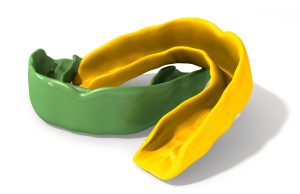Help for Soft Tooth Enamel
July 11, 2018Why Each Individual Tooth Is Important
July 26, 2018If you ever wonder if you or your child need a mouthguard, the answer is yes. If you get this thought, looking into getting your child a professionally-made mouthguard can save them dental injuries in the future. This simple preventative step can safeguard your child’s long-term dental health and development. Gain the peace of mind that your child’s mouth is equipped for safety when playing sports with a custom mouthguard!
Are Injuries Common?
The Journal of the American Dental Association (JADA) reported that 13-39% of all dental injuries are sports-related with the majority of the injuries occurring because mouthguards were NOT being used. When athletes (even young children) don’t wear mouthguards in contact sports, they run the risk of dental injuries. This is especially true if a child has early orthodontics, which have metal brackets and wires attached to the teeth.
The National Youth Sports Foundation for Safety reported that dental injuries are the most common type of orofacial injury sustained during sports participation. They estimate that at least 3 million people (if not more) will break or knock out a tooth playing sports each year. An athlete is 60 times more likely to suffer an oral injury when NOT wearing a protective mouthguard. So many people aren’t wearing guards during sports, that there is a recorded 5 million+ cases of knocked-out or broken teeth each year in sports activities. These are major dental emergencies that can lead to the complete loss of a natural tooth or infection. However, using mouthguards—especially ones fitted for the specific player—takes away almost all the risk for dental injury.
What Can A Mouthguard Do?
Half of dental sports injuries happen to young children. Trauma to the mouth can be especially hard on a young child, as they not only have to deal with an injury, but their growth could be upset by a bad enough injury. Young children still have jaw muscles that are developing and teeth that are trying to shift into place. Major injuries to the face and mouth can mean expensive dental and orthodontic procedures for your child, plus the many months it takes to fix dental problems.
However, a mouthguard can take away your child’s risk for dental injuries very simply, and these guards are quite inexpensive for parents to get. A mouthguard is a dental device that is placed in the mouth (much like a retainer) that keeps the teeth locked in place, cushioned all the way to the cheek with material to prevent injury. If a child gets hit in the mouth wearing a guard, they won’t break their teeth or knock one out, like what happens to so many others. They also prevent internal cuts or injuries to the gums.
Types of Mouthguards
The quality of the mouthguard you get will determine how much your child is protected. There are several types of mouthguards with varying fits and protection:
- Store-Bought Plastic Guard – These are plastic mouthguards that can be bought most places where sporting goods are sold. They can also be purchased at grocery stores and similar places. These come in various sizes, but are not moldable whatsoever. They can be bulky and can make breathing a bit harder to do when they are in the mouth. However, the hard plastic of these guards can help prevent injuries to the mouth if a player is hit hard in the mouth. However, there is often lots of space between the teeth and the guard when it’s in the mouth, which still leaves players open to mouth injuries.
- Boiled Guard – You can buy boiled guards over-the-counter at most sporting goods stores and even grocery stores. These are a step up from plastic mouthguards, as they are made of a more waxy, comfortable material. The point of these guards is to mold the guard to your mouth itself. They only come in a large and small size, which are usually more ideal for adults rather than children. You boil the guard at home for a few minutes, cool it off somewhat, and bite down on the guard while it molds to your teeth. Then, you let the mold harden and the guard is shaped to your teeth. However, these guards can be bulky for the rest of the mouth even if they fit the teeth snug. They also may not cover all of the tooth surface depending on how strong the bite was when the guard was molded.
- Custom-Made Guard – This is by far the best option if you are looking for maximum fit, protection and comfort. These mouthguards are made at the dental office. The dentist will take a mold of you or your child’s mouth and based off of that mold, will make a mouthguard that is contoured to the teeth and shape of the mouth. These guards fit very snug and just about perfect to the teeth, reducing the risk of mouth injuries significantly. Because the guards fit snug from being custom-made, there is not open spaces between the teeth and guard, which can sometimes cause dental injuries. These will be a bit more pricey than buying something from a grocery store, but they will save you money from having to do restorative dental procedures.
Custom Mouthguards
Although anything is better than nothing, not all mouthguards are created equal. The same goes for bite guards, toothbrushes, teeth whitening and pretty much any other dental service or appliance you can use. If you want a product or service that fits you or your child the best or one that will work the best, you have to go to a professional.
However, custom-made mouthguards are guaranteed to fit snug to the teeth, not allowing any space for injury to occur. Guards can even be made for problems such as sleep apnea or grinding. Invest in your child’s dental health and help them prevent mouth injuries. Call Family & Cosmetic Dentistry of the Rockies today at (970) 267-0993 for a free mouthguard consultation!




